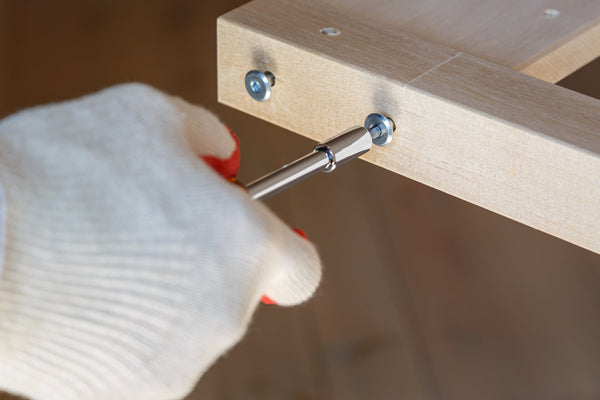Screwdriver Types and Screw Head Types Explained

Jump to:
Step into any workshop, whether it belongs to a professional tradesperson or a passionate hobbyist, and you’ll find one thing in common: screwdrivers.
Though often lying in the shadows while the heavier tools and more advanced equipment catch the spotlight, screwdrivers remain indispensable.
In Japan, where the pursuit of perfection is a cultural cornerstone, Japanese screwdrivers are also tools of exceptional quality and precision, designed to serve users across industries and applications. That’s why we’ve curated a full line of screwdrivers from trusted toolmakers in Japan.
In this article we’ll take a closer look at screwdrivers, exploring the types, uses, leading Japanese brands and the often-overlooked variety of screw heads they’re made to drive. By the end, you’ll have a newfound appreciation for these tools, as well as a better understanding of which one is right for your next project.
Types of Screwdriver

Screwdrivers may seem straightforward, but that’s just a ruse. Their sheer variety reveals a sophisticated approach to solving specific challenges.
As tool enthusiasts, it’s easy to get caught up in things like power and force. But sometimes finesse and precision play just as important of a role, if not more so.
The old saying about how “every tool is a hammer” sort of rings true here, doesn’t it?! Even among screwdrivers, not every tool should be a straightforward plus or minus. Instead, we realize that every job calls for a unique screwdriver strategy.
Below, we cover six major types of screwdrivers, detailing their designs, uses and how they meet the demands of different trades.
1. Demolition Screwdrivers: Built to Take a Beating
Demolition screwdrivers are the bruisers of the tool world.
These are not tools for delicate adjustments; instead, they’re built to withstand – and deliver – force in environments where precision is secondary to raw strength.
Designed to endure heavy impacts, they’re indispensable for tasks such as prying open nailed panels, breaking apart stubborn fixtures or even chipping away at materials during demolition work.
Key Features:
-
Materials: High-carbon or chrome vanadium steel for maximum durability
-
Handle Design: Often reinforced with shatter-resistant rubber or composite materials
-
Shaft Construction: Extra-thick and heat-treated to resist bending or breaking under stress
-
Typical Uses: Renovation work, construction and industrial environments
Many Japanese manufacturers excel in crafting demolition screwdrivers, focusing on durability and ergonomics.
When it comes to demolition screwdrivers, Deen makes a great one – useful and versatile!

Deen Demolition Screwdriver Set With Hex Bolsters (6 Pieces)
$119.00
2. Precision Screwdrivers: For the Finest Details
On the opposite end of the spectrum, precision screwdrivers are made for exacting tasks.
These tools are essential when working with miniature screws, often found in electronics, watches and scientific instruments.
A standard screwdriver won’t cut it when you’re dealing with a device that has parts as small as grains of sand. For these jobs, you’ve got to go micro.
Try the Anex Precision Screwdriver Handle with 4 Interchangeable Bits.
What Sets Them Apart:
-
Tip Diameter: As narrow as 1.4mm, ensuring they can fit into the tiniest screws
-
Material: Non-magnetic alloys like beryllium copper, ideal for use in sensitive environments
-
Handle Design: Small, knurled grips for precise control
-
Applications: Electronics repair, medical device assembly, jewelry making & more
Japanese manufacturers like Engineer have mastered the art of precision screwdrivers. Their tools boast tolerances within 0.01mm, making them the go-to choice for professionals who demand unparalleled accuracy.

Anex Precision Screwdriver Handle With Four Interchangable Bits 3614
$16.89
3. Impact Screwdrivers: Turning Force into Precision
When faced with stubborn, rusted or painted-over screws, an impact screwdriver becomes an invaluable tool.
Unlike conventional screwdrivers, impact drivers harness force from a hammer blow to generate rotational energy. This makes them highly effective at loosening screws that refuse to budge.
In this category, we like the Anex Impact Screwdriver Set.
In a nutshell, it’s where force meets precision. Does that sound like the best of both worlds? Sure does to us. That’s why we, along with countless other tool pros, turn to impact screwdrivers when it’s time to bring out the big guns and unscrew that stubborn or sticky screw.
Facing a broken screw? Check out our article on How to Remove a Broken Screw on the First Try.
How They Work:
-
Mechanism: Converts downward impact into rotational force, reducing the risk of stripping screw heads
-
Torque: Capable of delivering 2–3 times the force of a standard driver
-
Durability: Often designed with shock-resistant components to withstand repeated hammer strikes
Impact screwdrivers are particularly common in automotive repair and industrial maintenance. Their ability to deliver concentrated torque makes them indispensable for heavy-duty tasks.

Anex Nejitori Screw Removal Tool and Impact Screwdriver Set 1903-NS1
$49.00
4. Ratchet Screwdrivers: Efficiency in Motion
In tight spaces where you can’t afford to reposition your hand repeatedly, a ratchet screwdriver saves the day.
Its built-in ratchet mechanism allows continuous rotation in one direction without lifting the driver from the screw, making it a favorite among electricians, mechanics and assembly line workers.
Key Features:
-
Gear Ratios: Typically include fine-tooth mechanisms (e.g., 36-tooth or 72-tooth designs) for smoother operation
-
Reversibility: Quickly switch between tightening and loosening modes
-
Handle Design: Often ergonomic, reducing wrist strain during repetitive tasks
Japanese ratchet screwdrivers, like those from Deen, combine functionality with impeccable craftsmanship.
What does that mean for you? These tools deliver smooth, reliable performance in even the most cramped conditions.

Deen Pistol Grip Ratcheting Screwdriver Socket Driver Set With 7 Bits
$65.00
5. Torque Screwdrivers: Control Down to the Last Newton
When working with sensitive components, applying the correct amount of torque is critical.
Too much force can strip threads or damage materials, while too little means the screw won’t hold securely.
Torque screwdrivers take the guesswork out of this equation, offering precise control over applied force.
Specifications:
● Torque Range: Adjustable settings, often measured in Newton-meters (Nm)
● Calibration: Many models meet ISO standards for precision
● Digital or Mechanical Options: Digital models display exact readings, while mechanical ones offer tactile feedback
Torque screwdrivers are indispensable in industries like aerospace, electronics manufacturing and even high-end bicycle repair, where every detail matters.
6. Insulated Screwdrivers: Safety You Can Count On
Electricians working with live wires rely on insulated screwdrivers for protection.
These tools are designed with non-conductive materials to minimize the risk of electrical shock.
Safety Features:
-
Voltage Ratings: Certified up to 1,000 volts AC or 1,500 volts DC
-
Insulation Layers: Multiple coatings to ensure no current reaches the user.
-
Compliance: Built to meet IEC 60900 standards, ensuring international safety certification.
Japanese brands specializing in insulated screwdrivers focus on reliability, offering tools that are safe and yet durable enough for daily use.
Engineer makes a great circuit tester, ideal for electricians and those doing electrical work.

Engineer Circuit Tester Screwdriver DKD-01
$8.95
Types of Screw Heads
A screwdriver is only as effective as the compatibility between its tip and the screw it drives.
Different screw head designs address specific challenges, from providing grip in challenging conditions to deterring unauthorized access. Here’s a breakdown of the most common types.
1. JIS (Japanese Industrial Standard): Precision Above All
JIS screws, often mistaken for Phillips, are designed to prevent “camming out” (slipping).
Found in Japanese-made products like cars and electronics, they require a JIS-compatible driver for proper engagement.
Characteristics:
● Angle: A slightly steeper 57-degree tip compared to Phillips' 55-degree
● Use Case: Precision assembly in automotive and consumer electronics
We heartily recommend the Megadora 900 from Vessel, ideal for working with Japanese products, such as vehicles, home appliances, electronics and agricultural equipment.

Vessel Megadora 900 Non-Slip Chrome Vanadium JIS Screwdriver +2 150mm
$10.99
2. Flathead: The Classic Design
The flathead is the oldest screw head design, used in everything from woodworking to electrical applications.
Its simplicity makes it versatile, though it lacks the grip of more modern designs. That’s why it’s great at what it does, but isn’t the only tool in the box when it comes to screwdriver prowess.
3. Phillips: The Global Standard
Developed to reduce over-tightening, Phillips screws are ubiquitous across industries.
While they’re easy to use, they’re prone to cam-out under high torque, which can be a drawback in demanding tasks. Tool pros know when to use a Phillips and when to turn to another player on the bench.
4. Torx: The Star Performer
Known for its six-pointed star shape, the Torx screw provides superior grip, reducing the risk of stripping.
It’s commonly used in automotive and industrial applications.
5. Robertson: Canada’s Gift to Fasteners
This square-shaped design offers excellent torque transfer, making it popular in woodworking and construction. Fastening tools don’t get much better than the Robertson.
Thanks Canada! Not just for all that wood, but for the reliable Robertson screwdriver.
6. Hex: The Workhorse of Machinery
Hex screws, with their six-sided heads, are favored for their durability and ease of use in machinery and bicycles.
Not to be confused with the Allen key, which is all too familiar to IKEA customers… Actually, they can be associated together, though hex screws are generally for more sophisticated work than DIY semi-disposable furniture assembly at home.
7. Pozidriv: Enhanced Phillips
Pozidriv screws improve upon the Phillips design, adding more contact points to reduce slippage.
They’re common in European construction projects.
8. Proprietary Designs: Keeping Things Exclusive
Some manufacturers, like Apple or Nintendo, use proprietary screw heads such as pentalobes or tri-wings to prevent tampering. Others, like Jura, use oval screws to secure specialized equipment.
If you come across a product with a proprietary screw design, you’re probably going to need a new tool in the box to do the repairs or other work on them.
The Japanese Edge in Screwdrivers
What sets Japanese tools apart is the philosophy behind their design and production.
Japanese toolmakers prioritize functionality, durability and user comfort, ensuring their products meet the highest standards of performance.
Companies like Vessel subject their tools to rigorous quality checks, ensuring that they won’t fail even in the most punishing conditions.
Whether it’s the precision of a JIS screwdriver or the durability of an impact driver, Japanese tools embody a reputation for solid quality that resonates with serious professionals and hobbyists alike.
After all, in the world of tools, it’s often the smallest details that make the biggest difference.

0 comments